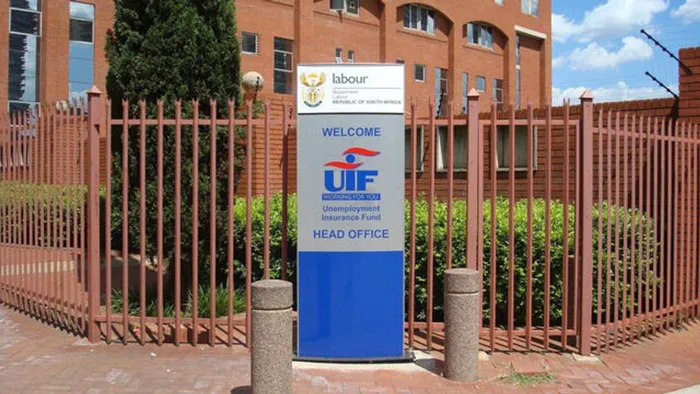
A sign showing the UIF logo at its office. Despite assurances from UIF leadership, concerns remained about the entity’s ability to deliver on its mandate while addressing systemic challenges that have plagued its operations. Image: Independent Newspapers Archives
Image: Independent Newspapers Archives
THE Unemployment Insurance Fund (UIF) found itself under intense scrutiny during a recent Parliamentary Committee meeting, as legislators grilled officials over persistent financial mismanagement, irregular expenditure, and governance failures.
Despite assurances from UIF leadership, concerns remained about the entity’s ability to deliver on its mandate while addressing systemic challenges that have plagued its operations.
One of the most glaring issues raised was the UIF’s consistent failure to submit its annual financial statements on time, leading to repeated audit qualifications. According to the ANC’s Gijimani Skosana, the entity’s “non-compliance with legislation is concerning”. He pointed out that the 2023/2024 audit outcome was still outstanding at the time of the meeting, despite legislative requirements for timely submissions.
The UIF’s chief financial officer, Thembeka Puzi, attributed these delays to challenges in obtaining audited financials from investee companies, many of which were either under business rescue or non-compliant themselves.
However, this explanation did little to quell criticism. Skosana highlighted a dramatic surge in irregular, fruitless, and wasteful expenditure — from R393 000 in 2019/2020 to R49.2 million in 2022/2023 — and questioned why such deterioration had occurred post-Covid-19.
A significant portion of this increase was linked to SAP software licences purchased for an Enterprise Resource Planning (ERP) system that remains incomplete. The UIF’s chief investment officer, Raymond Makweya, admitted that the project faced setbacks due to the pandemic and other typical project management challenges.
Yet, committee members were left wondering why no one had anticipated these risks before procurement. As the chairperson aptly asked: “Why did no one foresee whether the system would work?”
The Temporary Employer/Employee Relief Scheme (Ters), implemented during the Covid-19 pandemic, continues to cast a long shadow over the UIF’s reputation. UIF Commissioner Lucky Mkhonto outlined efforts to verify payments made under the scheme, revealing that some funds had gone to deceased individuals, foreign nationals, and even incarcerated persons.
While investigations by the Special Investigating Unit (SIU) led to 111 referrals for prosecution and 21 convictions — including one resulting in a 20-year prison sentence — committee members remained dissatisfied with the pace and severity of consequence management.
The DA's Farhat Essack raised concerns about lenient sanctions imposed on officials involved in maladministration, including written warnings and minor salary deductions. The ANC’s Helen Neale-May echoed this sentiment, saying: “Serious transgressions have only resulted in written warnings… [This] amounts to a mere slap on the wrist.”
She called for stricter measures to hold senior officials accountable, urging the board to implement clear disciplinary actions to prevent recurring misconduct.
Another contentious issue was the UIF’s investment portfolio, particularly unlisted companies managed by the Public Investment Corporation (PIC). Puzi said the UIF provided the PIC with a mandate specifying strategic asset allocation but does not control specific investment decisions. This arrangement came under fire after several unlisted investments failed to meet expectations, prompting the UIF to halt further ventures in this space.
“We’ve learnt important lessons,” Puzi conceded, adding that the PIC had introduced a turnaround division to assist struggling companies. Nevertheless, Neale-May expressed frustration, asking: “How was money paid to companies now under business rescue?”
The scheduled engagement with the PIC the following day promised to shed more light on this troubling matter.
The infamous Eastern Cape Taxi Association scandal dominated discussions, with revelations that the UIF had disbursed about R220m to 61 entities created within its own system. Director of Risk Management at the Department of Employment and Labour (DEL), Tshepiso Maphathane, confirmed that R35m had been recovered through court orders and asset forfeiture. However, investigations into more than 80 additional entities are ongoing, highlighting the scale of the alleged fraud.
Mkhonto described this as “the largest single case the UIF has dealt with”, involving collaboration between the Hawks, SIU, and UIF. Despite progress, committee members demanded greater transparency, with the chairperson requesting a detailed written submission on recoveries and legal proceedings.
Minister Nomakhosazana Meth emphasised her commitment to improving oversight, shifting audit reviews from quarterly to monthly sessions. She acknowledged the need for stricter enforcement of ethical conduct and discipline, saying: “We must move from managing the audit process to achieving significant improvements in audit outcomes.”
However, she clarified that her role in disciplinary matters is limited by law, reiterating that administrative processes must be respected.
While the UIF assured the committee of its dedication to resolving these challenges, skepticism lingered among legislators. The chairperson summed up the mood, reminding attendees that skills development and employment remain critical priorities for South Africa.
“Our focus is on improving the lives of South Africans struggling to find employment,” he said, urging the department to deliver tangible results ahead of the next progress report in September.
For now, the UIF stands at a crossroads, tasked with rebuilding trust, ensuring accountability, and delivering on its mandate — a monumental challenge given the depth of its current woes.